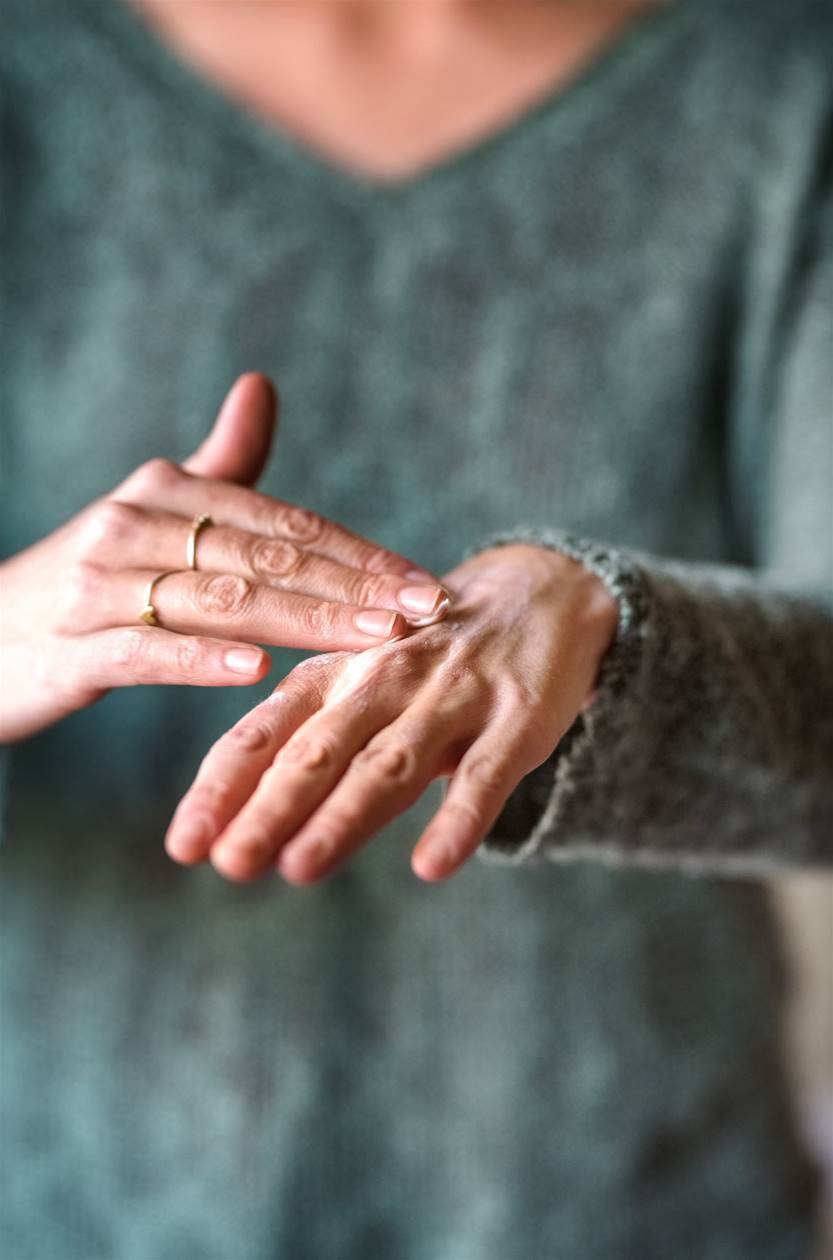Melbourne-based dermatologist Dr Adam Sheridan of Specialist Dermatology Surgery & Laser has some top tips on how to fix common skin issues.
‘Crocodile hands’

What is it: Now that we’re all washing our hands many times a day, some of us are becoming intimately familiar with the reptilian joys of dry, flaky and irritated hands.
Healthy skin is covered by a fine protective film known as the ‘acid mantle’. This works to keep the bad out and the good in. When the delicate calibration of this barrier is compromised by harsh soaps and vigorous hand scrubbing, the skin loses the ability to retain moisture, becoming inflamed and susceptible to further irritation and even infection.
What can I do: Avoid harsh soaps and hand sanitisers; especially those that are scented or foaming. If application stings this is not a good sign. Check for open abrasions. These will benefit from intensive emollient repair or zinc cream. Use a pH-balanced soap-free cleanser and water where possible, followed by a non-scented emollient moisturiser; ideally one that contains ceramides. Ceramides are an essential component of the skin barrier that attracts and stores moisture, providing additional protection against irritants, pollutants and infectious agents.
‘Mask face’
What is it: On the plus side, wearing a face mask not only reduces transmission of any airborne virus travelling in droplets from sneezing, coughing, loud talking, shouting and singing; they also reduce self-contamination from face touching. (Eyewear is of further benefit to prevent contact between virus-laden droplets and the eyes.)
However, with benefits come downsides. Prolonged mask wear may generate a hot humid environment about the face. This humidity, coupled with friction from the mask itself, is conducive to a number of facial woes.
- Seborrhoeic dermatitis. This form of dermatitis favours the ‘greasy’ and hair-bearing areas of the face such as the eyebrows; periocular, peri nasal and perioral regions. We liken this to ‘dandruff of the face’ and seborrheic dermatitis is indeed thought to relate to an inflammatory reaction to the commensal yeast and mites resident upon the skin. Seborrhoeic dermatitis is turbo-charged by the humid sub-mask environment. What can I do: rinse the scalp and facial areas with diluted antidandruff shampoo from time to time, and clean your face with a soap-free cleanser and oil-free moisturiser. Should problems persist, you guessed it, consult with your doctor.
- Acne rosacea. This common syndrome generally presents as a combination of facial redness with a propensity to easy flushing, formation of broken vessels upon the nose and cheeks, and acne lesions. In the Covid-19 era this often co-exists with seborrheic dermatitis. What can I do: Medical treatment is often needed, though milder cases may be reduced through gentle soap-free cleansing, application of an oil-free moisturiser. Other triggers to be mindful of include harsh winds and extreme weather; hormonal factors including stress and insulin surges, and digestive tract problems - it has been shown that the facial skin may mirror inflammation occurring in the bowel.
Fun fact: The skin and bowel are physically connected with each other at each end of the body, and work in harmony through the immune system.) Acne rosacea may, therefore, need you to examine your diet, reduce alcohol intake, increase plain water intake and consider taking a quality probiotic.
- Friction dermatitis. The name says it all. Mask and tie friction points about the ears, nose and jawline frequently cause itch, irritation, post-inflammatory pigmentation and may in some cases transition into…
- Acne mechanica. Quite literally acne arising from mechanical trauma of the skin, such as applying oils, face creams and additional micro-trauma from scrubs and peels. What can I do: Avoid using soap to clean your face, instead use a fragrance-free, hydrating cleanser, and afterwards apply an oil-free moisturiser containing ceramides which help support the skin barrier and rehydrate the skin. Also, try placing a cotton underlay between your face and the mask, or use large buttons attached to a cap as your anchor/tie point instead of your ears. Should you suspect that there is more to your dermatitis or acne, seek advice from your doctor and dermatologist.
‘Isolation skin’
What is it: Feeling like your ‘healthy glow’ had disappeared and has been replaced by a dull complexion and dry skin. Covid confinement has caused some women to experience accelerated development of fine lines and wrinkles, facial pigmentation and reduced skin volume.
What causes it: As part of the lockdown lifestyle we’re bathing and showering less. As a result our skin, especially of the humid and greasy body parts and folds, scalp, and areas around the eyes, ears and mouth, may become susceptible to dermatitis, flaking and acne. Without as much cleansing, skin no longer renews in a smooth and regular fashion. Left to compound over days to weeks. this vicious cycle delivers angry skin; lacking the lustre of healthy hydrated skin. Signs of ageing and damage appear and the skin’s ability to repair these is diminished.
What can I do: Wash your face, scalp and body every day with a pH-neutral soap-free wash. Follow within a few minutes of exiting the shower or bath with an oil-free moisturiser, ideally containing ceramides. Keep shower and bath-time short. Indulging in either for more than eight minutes will dehydrate your skin and reverse the potential benefits of healthy bathing. Make sure you’re eating a healthy balanced diet containing natural sources of protein, Vitamin C and zinc (the building blocks of healthy skin). Avoid excess alcohol and sugar. Regular exercise can also help. Spend time outdoors getting Vitamin D from the sun (without skipping the sunscreen) works together with exercise to support healthy skin and bones, ballast the immune system and keep stress in check.
‘Isolation hair’
What is it: The hair’s equivalent of ‘isolation skin’. Haphazard hair and scalp care regimens, combined with a poor diet, not enough exercise or sleep conspires to produce an irritated scalp, brittle and thinning hair. Any natural underlying genetic tendency towards thinner scalp hair may be triggered by stress hormones and oxidative stress from alcohol, and eating too many high sugar-containing processed foods.
What can I do: Like the skin, healthy hair appreciates exercise, regular sleep and a varied diet rich in protein, vitamins, iron and essential minerals. Avoid the temptation to beat misbehaving hair into submission with extremes of hair drying, styling and colour. Allow your scalp and hair to naturally dry from a damp state from time to time and preference fragrance-free gentle shampoo and conditioner.
‘Android face’
What is it: Perhaps you noticed how during Covid lockdown people on the street had become aloof, glum and distant - ‘androids’! Human beings tend to over-value verbal communication and underestimate the value of our non-verbal communication. Masked up and virus safe, we sacrifice at least 2/3 of our facial expressive capacity. (Add to this the fact that some people have had cosmetic treatment to minimise movement of their brows and forehead).
What can I do: Be conscious of the limitations a mask places on your natural expressiveness. Work at using your eyes and forehead expressively. Speak in a clear voice through your mask and use body language and verbal inflection to further convey your meaning and mood. Give others the benefit of the doubt until you discover theirs.










